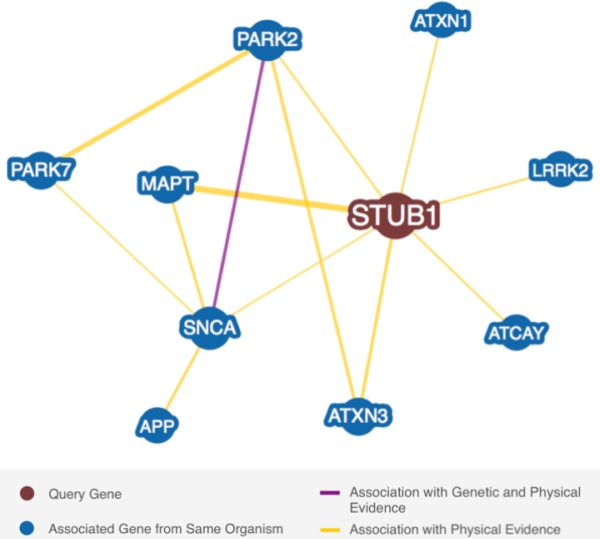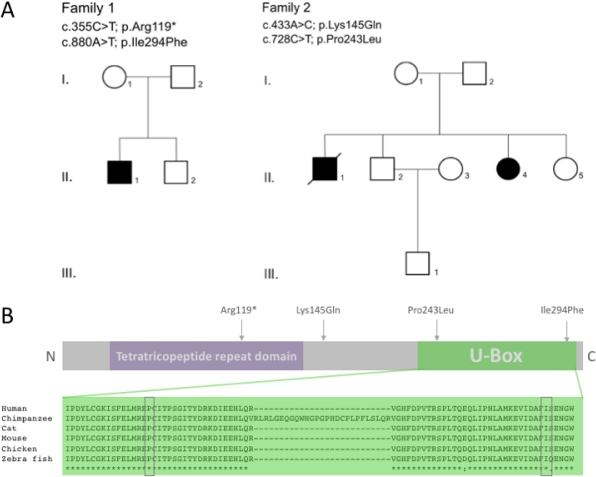Session Information
Date: Wednesday, June 22, 2016
Session Title: Ataxia
Session Time: 12:00pm-1:30pm
Location: Exhibit Hall located in Hall B, Level 2
Objective: (1) To provide phenotypic and imaging evidence for a widespread neurodegenerative process caused by mutations in CHIP, thus demonstrating a close clinical correspondence to its universal biological function in neurodegeneration. (2) To confirm Gordon Holmes syndrome (GHS) as a phenotypic manifestation of CHIP mutations.
Background: STUB1/CHIP is a central component of cellular protein homeostasis and interacts with several proteins involved in the pathogenesis of neurodegenerative diseases (Fig. 1). This gives rise to the hypothesis that mutations in CHIP might cause a far more multisystemic neurodegenerative phenotype than the previously reported cerebellar ataxia syndrome. 
Methods: We performed WES on 2 ataxia cohorts to screen for STUB1 mutations. STUB1/CHIP interactors were identified using BioGRID, and filtered for neurodegenerative markers. Protein function-phenotype association was established by clinical and w.a. MRI DTI examination of 3 patients from 2 STUB1 index families and a literature research for functional interaction of CHIP with neurodegenerative proteins.
Results: We identified 4 novel STUB1 mutations in 2 index families. The patient of family 1 presented severe dementia, spastic tetraparesis and hypogonadism, next to cerebellar ataxia. Also the 2 patients of family 2 presented with a severe multisystemic phenotype including dementia, spastic tetraparesis, autonomic dysfunction, and epilepsy beside cerebellar ataxia (Fig. 2A). DTI confirmed degeneration of manifold cerebral tracts. 3 of the identified mutations affect in the highly conserved U-Box domain, important for ubiquitin ligase activity (Fig. 2B). Aberrant CHIP function influences multiple cellular pathways involved in the pathogenesis of Alzheimers and Parkinson’s disease, and ataxia, thus corresponding to the severe multisystemic clinical manifestation and early onset dementia of the disease. 
Conclusions: We provide clinical and imaging support for CHIP as a crucial converging point of manifold neurodegenerative processes, thus corresponding with its universal biological function in neurodegeneration. Further, our data reveal the second independent STUB1 family with ataxia and hypogonadism reported so far, demonstrating that GHS is indeed a systematic manifestation of STUB1 mutations. However, it does not present in isolation, but as part of a broad multisystemic neurodegenerative process.
To cite this abstract in AMA style:
S.N. Hayer, K. Smets, B. Bender, T. Deconinck, S. Züchner, L. Schöls, R. Schüle, P. De Jonghe, J. Baets, M. Synofzik. STUB1/CHIP mutations cause Gordon Holmes syndrome as part of widespread multisystemic neurodegeneration: Evidence from novel mutations [abstract]. Mov Disord. 2016; 31 (suppl 2). https://www.mdsabstracts.org/abstract/stub1chip-mutations-cause-gordon-holmes-syndrome-as-part-of-widespread-multisystemic-neurodegeneration-evidence-from-novel-mutations/. Accessed February 15, 2026.« Back to 2016 International Congress
MDS Abstracts - https://www.mdsabstracts.org/abstract/stub1chip-mutations-cause-gordon-holmes-syndrome-as-part-of-widespread-multisystemic-neurodegeneration-evidence-from-novel-mutations/
